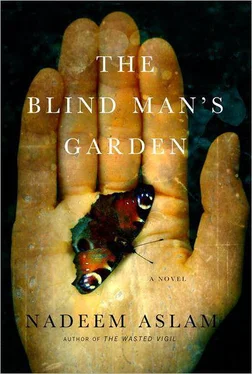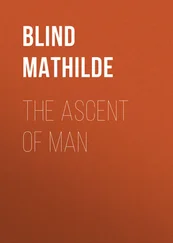When he mistakes a girl in the distance for Naheed — a quick second glance confirms it not to be her — there is a surge of pain in him followed by sudden directionless anger. As he waits for it to pass even the murmur of the Korans becomes an annoyance. Whenever he is drunk, his feelings about religion can become vocal — revealing a sham, his own and his country’s. ‘I’ll announce tomorrow that I don’t believe in Allah or Muhammad or the Koran,’ he’d said to Yasmin two evenings ago. ‘But I’ll be beaten to death by a mob for being an infidel, or taken to jail and shot dead in the middle of the night by policemen or set upon by other prisoners. So I go on pretending. But I am not a hypocrite. I’d be a hypocrite if I was free to say and act what I believed in and didn’t. But I am not free.’
There is a commotion in the distance, beside the northernmost wall, and they see the group of black-clad women has appeared and is striking the visitors with canes, the mourners’ lanterns hurrying in every direction. Each set of women is asking for help from Allah in ending the menace that is the other.
Tara stands up, kissing her Koran and closing it. ‘We should leave.’
Some of the women are fighting back. The men who have brought them here too are receiving blows from the black-clad women, or from the zealous men who brought the zealous women here.
Two cloaked figures appear behind Yasmin, their draperies moving in urgent passionate waves, their heads tied with green bands with the flaming-swords motif of Ardent Spirit. ‘Women are not allowed into graveyards,’ one of them shouts and swings at Yasmin’s head with the metal-tipped cane. ‘It’s because of people like you’, the other veiled woman says as she strikes Tara in the stomach, ‘that Allah is punishing the entire Muslim world these days.’
Basie takes hold of both canes as they are raised again for further blows, but one of them is slippery — he realises it’s Yasmin’s blood — and it slides out of his grip and comes down on Yasmin’s head again. She cries out. The other woman struggles to get her cane free and shouts, ‘We stop you from coming in the daytime and you start to come at night! There is no end to the ingenuity of the wicked.’
Yasmin is trembling on the ground, thick lines of blood pouring from beyond her hairline and into her eyes. ‘My mother is buried here,’ she says, ‘and my brother.’
Basie lets go of the other cane and bends down to her and the freed weapon is brought down onto his back, feeling as though he has been slashed with a razor.
Tara dodges the cane aimed at her and it strikes the Koran in her hand instead, brutally. ‘Look what you made me do,’ the assailant — only her contact lenses visible, her hands encased in black gloves — screams with distress and gives Tara a fierce fluent strike to the shoulder.
Around them some of the graves are in flames, from the oil that has been spilled by the broken lanterns.
‘What strange times are these,’ says Tara as they wend their way through the dead to safety, ‘when Muslims must fear other Muslims.’
At home he examines the cut on Yasmin’s head and bandages it. Agony gently vibrates out of her eyes as she tries to fall asleep.
He stays in the chair beside her and just before dawn listens to Tara and Rohan get up to say the first prayers of the day. He goes up to the roof and finds comfort in the brightening sky, receiving his share of the earth through the five senses, the dawn glow of ochre and cinnabar, the light calling things into existence, the thin voices of birds. As the sun rises higher he walks through the garden where a near-thousand flowers are opening and goes out into the streets to call the doctor, the neighbourhood waking up around him — the inevitable dailiness, the shops being opened at the crossroads, the butcher unloading the skinned carcasses he has brought from the slaughterhouse in a rickshaw, an early-rising child leaning against a doorframe, a look of suspicion and hostility in his eyes about the world of the adults, a woman carrying a small Madagascar gulmohar tree on her head for fuel, the branches trailing behind.
He stops on realising that he had caught a glimpse of a figure in a side street that had had a gait resembling Naheed’s. Two minutes ago. He turns back and breaks into a run, but she is just another one of the dozens of girls he has mistaken for her since she vanished.
The doctor says Yasmin’s cuts are superficial and he places stitches on the scalp with a tiny crescent needle. He tells her to rest, perhaps take a day off work. Basie kisses her mouth when they are alone in the room and astonishingly she wants more, an intensity in her body as when adolescence’s delight had first found completion years ago, in both of them, here in these very rooms, and he walks to the door and bolts it shut and comes to her, shedding his clothes on the stripes of light blazing on the floor. Mortality? When he is near her his impermanence has no power over him.
He bathes and eats the breakfast Tara has cooked, and Yasmin reminds him that Father Mede has asked for a few cuttings from the garden. Over half the plants at St Joseph’s are from here. At eight o’clock he gets into his car alone, to drive to St Joseph’s four miles away. A rose tree, bronze with thorns, sprinkles dewdrops onto his crisp white shirt just before he leaves the house, the cotton becoming grey in an everyday miracle.
*
The six head boys from the six houses of Ardent Spirit have been awake since before dawn. Ahmed, the head of Baghdad House, gives everyone the final instructions. But the assault and the siege have been planned meticulously over the past several weeks and there is little need for further words. They sit and collect their thoughts before setting off for St Joseph’s.
They are in a ruined seventeenth-century mausoleum that is approached along the blacktop road in an easterly direction from Heer, parallel to the old thoroughfare that disappears towards Amritsar. A large domed building with four stubby minarets at each corner, constructed on a high plinth from deep red sandstone but now in an advanced state of decrepitude. Avoided by the people of the vicinity because it is said to be haunted.
Deo Minara. Minaret of Demons.
In addition to the six Ardent Spirit boys and the twenty-four recruited men, there are two young women — to contain and supervise the school’s female staff and children during the siege. Covered in black, they wear pistols under their cloaks and belts of ammunition are wound about their waists.
Among the twenty-six recruits there are seven who don’t know what today’s destination is, and what is planned once they reach that destination. Nineteen are in the know. There was pleasure in Ahmed’s mind when he recalled that the number of men who were alleged to have carried out the attacks in the United States last September was nineteen.
‘Who is buried here?’ the head of Mecca House asks him as he approaches a crumbling arch to watch the 147 rucksacks of supplies being loaded onto a truck that was stolen by the head of Ottoman House late last night.
‘The governor of the area during the time of the Emperors Shah Jahan and Aurangzeb.’
Shah Jahan who built the Taj Mahal, which is now lost to Hindu India.
Aurangzeb who empowered officials to enter and break musical instruments anywhere they heard the sound of music, who barred women from visiting shrines to prevent lasciviousness in holy and sombre places, a virtuous and humble man who forbade the writing of the chronicle of his reign as an impious conceit, but whom they now belittle by saying he had no vision, only ambition, no reach, only grab.
Aurangzeb who in April 1669 had ordered the eradication of all religions except Islam in his realm.
Читать дальше












